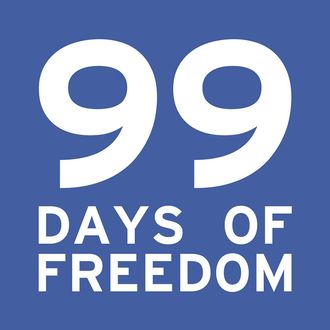
A Dutch company is promising “99 days of freedom,” but with a mighty big catch: You have to give up your Facebook account.
If you sign up via its website, as about 7,500 people already have, you’ll be asked to complete surveys intended to measure your happiness on the 33rd, 66th, and final day of your Facebook fast. The point, according to the creative agency called Just, is to test whether taking a leave of absence from the social-networking site will improve or otherwise alter your mood.
According to Facebook usage data, the average user spends about 17 minutes per day on the site — which, frankly, seems a little low. The guys at 99 Days of Freedom figure this adds up to more than 28 hours over a three-month period. What, their website tantalizingly asks, will you do with all that found time?
Quitting social media, or at least taking an extended break from it, has become something of a thing: Last month, the comedian Patton Oswalt announced that he was staying off Twitter for the summer, and Grist columnist David Roberts is in the final months of a yearlong online sabbatical. You’ve probably had a friend whose profile suddenly, if temporarily, went dark, or maybe you’ve done it yourself; about six in ten Facebook users say they’ve taken a temporary break from the site at some point. It’s sort of like the modern-day version of threatening to go live in a cabin in the woods — the idea that, if only you could shut yourself away from the people, the noise, the pokes, maybe you could finally nurture your poor, diminishing attention span back to life.
And it is true that taking a break from something helps you re-evaluate the way you use it, hence the usefulness of vacations or retreats. “Stopping anything for a while gives us a new perspective on things (try TV or your car),” Pamela Rutledge, director of the Media Psychology Research Center, said in an email to Science of Us. “It shows us what we do automatically, what we didn’t fully appreciate and how we used things.” All helpful and good, she says.
The problem, Rutledge said, is placing the blame entirely on Facebook, or Twitter, or Instagram, or all three plus whatever else the kids are using these days. If you feel like you’re sinking too much time into Facebook or the like, the core of that habit isn’t going to go away just because you’ve closed down your account.
Without Facebook, you won’t suddenly decide to read Middlemarch; you won’t suddenly start training for a marathon. “This presumption that social media is ‘doing something’ to us takes the responsibility off one’s actions and tries to lay it on the tools,” she said. None of these platforms are going away any time soon, after all. It’s probably a better idea, then, to consider how to live with them in a more balanced way, rather than (temporarily) trying to pretend they don’t exist.




